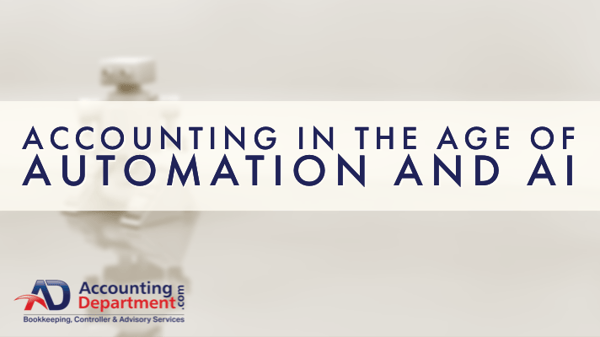ACCOUNTING IN THE AGE OF AUTOMATION AND AI:
EXPLORING POSSIBILITIES, OPPORTUNITIES & CHALLENGES IN ACCOUNTING TODAY

In the 1990s, with the rise of self-computing and comprehensive accounting software platforms, businesses were sold a promise that the need for specialized accountants to oversee their books would soon be a thing of the past. Of course, that didn’t happen and in fact, the rise of accounting technology led to a need for more training and specialized understanding to truly leverage the possibilities presented by accounting software. But nonetheless, as technology advances, we continue to pursue the idea that, in these extraordinary times, technology holds the promise and opportunity to do things better, more efficiently, and with less human error or intervention.
Today we look to the rise of automation and AI with the expectation that it may provide significant advancements in the way small and mid-sized businesses manage their accounting. Again faced with balancing the downside of being sold overreaching promises with the upside of ever-evolving capabilities, we find ourselves often in the position of counseling businesses on what they can expect while mitigating the risks that come with venturing into the new and largely unknown. Simply, what can you expect today from automation and AI in accounting and how can you know if it will work for you?
What Does Automation and AI Offer SMBs Right Now?
In its current form, AI is recognized for taking over menial tasks and freeing human operators from the tedium of data entry so they can focus on higher-level data analysis and management that require human insights. Human insights that can’t currently be replicated by machines. Large accounting firms are leveraging dedicated AI teams to support enterprise-level companies with large scale, big data projects that utilize Natural Language Processing to detect anomalies. But at their current costs and capabilities, they are not well-suited for the SMB marketplace.
But this isn’t stopping new technology and service providers in the SMB ecosystem from attempting to sell these benefits. Small businesses can utilize a significant amount of automation and AI capabilities if their accounting is very simple. Accounting based on cash-based transactions or that are governed by very basic logic rule processing can setup a lot of automation to process their books monthly. But for those companies on an accrual-based of accounting, there are more questions to ask. If you have accounting items such as prepaid expenses, deferred revenue, time tracking and job costing, reporting based on milestones or projects, or any other “less simple” accounting needs, automation and AI have less to offer at this time.
How to Evaluate Technology
Interested in whether automation and AI can work for your company? We’ve compiled key questions to ask when evaluating new technology and systems:
- How is the technology evaluating your transactions?
- What does it do to evaluate your transactions to decide whether or not it’s a prepaid or expense that goes to the P&L?
- How does it decide? How does the technology determine how long a period it will be expensed over once it is determined a prepaid expense?
- Is it going to automatically make those entries? Or is a human still going to have to do them every month?
- For deferred revenue, is the software recognizing transactions properly, attributing to accounts, and amortizing accordingly?
- Is your business driven by milestones or projects? How does the technology align to them?
- When the technology evaluates a project, can it identify revenue and expenses?
While promises of automation and AI are definitely appealing, fully automating the accounting in a small business with accrual-based accounting is simply not in existence today. Technology companies are actively working to improve recognition and create more dynamic rule processing to support more complex small and mid-sized businesses. But most currently available advanced accounting technology is cost-prohibitive among SMBs—they are primarily priced for enterprise-level accounting at large corporations. Beware of sales pitches that avoid answering these questions and make sure you know how the software is going to support your accounting needs before implementing anything new.













